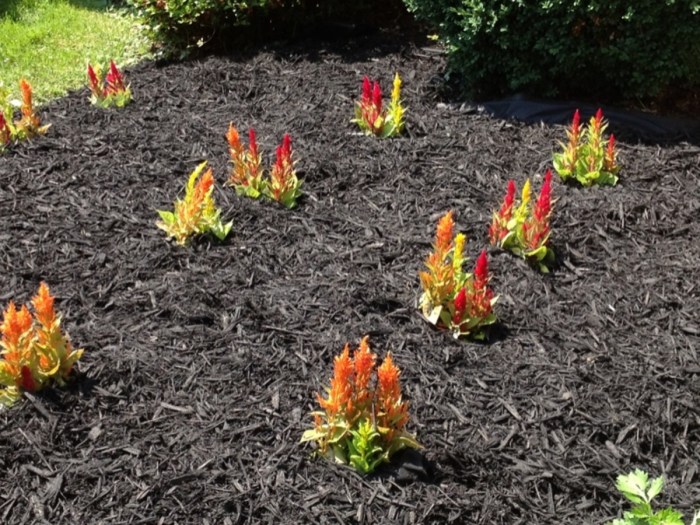Types of Mulch and Flower Compatibility: Can You Plant Flowers In Mulch

Can you plant flowers in mulch – Choosing the right mulch is crucial for thriving flower beds. Different mulches offer varying benefits and drawbacks, impacting flower growth depending on their particle size, decomposition rate, and interaction with the soil. Careful consideration of these factors ensures optimal conditions for your chosen blooms.
Mulch Type, Flower Type, and Their Interactions
The selection of mulch significantly influences flower health. The following table illustrates the compatibility of various mulch types with different flower types, highlighting their advantages and disadvantages.
| Mulch Type | Flower Type | Pros | Cons |
|---|---|---|---|
| Wood Chips | Roses, Daylilies, Hostas | Excellent water retention, good insulation, improves soil structure over time. | Can tie up nitrogen initially, potentially slowing growth in nitrogen-sensitive plants; larger chips can hinder shallow-rooted plants. |
| Straw | Annuals, Vegetables (planted directly into the ground) | Lightweight, inexpensive, readily available, helps retain moisture, suppresses weeds. | Decomposes quickly, requiring more frequent replenishment; can harbor fungal diseases if not properly composted. |
| Pine Needles | Acid-loving plants (Azaleas, Rhododendrons, Blueberries) | Acidifies soil, excellent drainage, slow decomposition, provides consistent moisture. | Can be acidic, unsuitable for alkaline-loving plants; may require initial soil pH adjustment. |
| Shredded Bark | Perennials, Shrubs | Moderately slow decomposition, good water retention, improves soil structure, aesthetically pleasing. | Can become compacted over time, potentially hindering drainage if not regularly replenished. |
Impact of Mulch Particle Size on Root Development
Mulch particle size directly affects root development. Larger particles, such as coarse wood chips, leave more space between them, promoting better aeration and drainage, benefiting plants with extensive root systems like roses or peonies. However, smaller particles, like finely shredded bark or straw, can compact more easily, potentially restricting root growth in shallow-rooted plants like pansies or petunias. For example, using large wood chips around a shallow-rooted annual might lead to poor water penetration and restricted root spread, whereas fine straw around a deep-rooted perennial could improve water retention but potentially cause compaction issues if too thickly applied.
Effects of Mulch Decomposition on Soil pH
Mulch decomposition alters soil pH. The decomposition of organic mulches, like wood chips or straw, releases organic acids which can lower the soil pH, making it more acidic. This is particularly noticeable with pine needles, which naturally have a low pH. Conversely, some mulches might slightly raise the soil pH. This change in pH affects nutrient availability and can influence plant growth.
For example, acid-loving plants like azaleas thrive in a more acidic environment created by pine needle mulch, while alkaline-loving plants may struggle.
Illustrative Representation of Mulch Decomposition and Soil pH:
Imagine a line representing the soil pH scale, ranging from highly acidic (left) to highly alkaline (right). As organic mulch decomposes (represented by arrows pointing downward from the mulch layer to the soil), the soil pH shifts towards the acidic end of the scale (indicated by the arrows pointing left). The extent of the shift depends on the type of mulch and the initial soil pH.
So, you wanna plant flowers in mulch? Totally doable! Just make sure you choose the right kind – maybe something that’ll really stand out, like a magnificent tall plant with red flowers for maximum drama. Then again, if your mulch is more “sad compost pile” than “lush garden bed,” you might need a miracle, not just some pretty petals.
Good luck, and may your flowers flourish (or at least not immediately shrivel up and die!).
The decomposition process also releases nutrients, enriching the soil (represented by upward-pointing arrows from the soil).
Acidic Neutral Alkaline
————————————————-
←←←←← Mulch Decomposition →→→→→
↑ ↑ ↑ Nutrients Released ↑ ↑ ↑
Maintaining Flowers in Mulch

Maintaining the health and vibrancy of your flowers planted in mulch requires a consistent and mindful approach. A well-structured maintenance schedule, coupled with understanding the specific needs of your plants and the properties of your mulch, will contribute significantly to their flourishing. Regular monitoring and proactive measures will help prevent common problems and ensure a beautiful, thriving garden.
Monthly Maintenance Schedule for Flowers in Mulch, Can you plant flowers in mulch
A monthly maintenance plan provides a structured approach to caring for your flower beds. This schedule Artikels key tasks to ensure your flowers receive the necessary care throughout the growing season. Adjustments may be needed based on your specific climate and the types of flowers you’ve planted.
| Month | Task | Details |
|---|---|---|
| March/April | Early Spring Cleanup | Remove winter debris, gently loosen the mulch, and check for any winter damage to plants. Begin light fertilizing if needed. |
| May | Watering and Weeding | Increase watering frequency as temperatures rise. Regularly remove weeds to prevent competition for nutrients and water. |
| June/July | Peak Bloom Maintenance | Water deeply and consistently, especially during hot spells. Deadhead spent blooms to encourage further flowering. Monitor for pests and diseases. |
| August | Mid-Season Refresh | Add fresh mulch to replenish any that has broken down. Fertilize again if needed, following product instructions. |
| September/October | Late Season Care | Reduce watering frequency as temperatures cool. Remove any diseased or dead plants. Prepare for winter by adding a thicker layer of mulch. |
| November/December | Winter Protection | Ensure adequate mulch coverage to protect plant roots from frost. Reduce watering to a minimum, only if necessary. |
Proper Watering Techniques for Flowers in Mulch
The effectiveness of watering depends on several factors, including the type of mulch used, the climate, and the specific water needs of your flowers. Overwatering or underwatering can have detrimental effects on plant health.Proper watering involves deeply soaking the soil, ensuring water reaches the roots. For wood-chip mulch, water more frequently than with heavier mulches like shredded bark, as wood chips dry out more quickly.
In arid climates, more frequent watering may be necessary, while in humid climates, less frequent but deeper watering is often sufficient.Overwatering leads to root rot, causing wilting, yellowing leaves, and ultimately, plant death. Underwatering results in stunted growth, wilting, and decreased flower production. Observe your plants carefully; wilting is a key indicator of insufficient water.
Preventing Common Issues in Mulch Beds
Proactive measures are crucial in preventing common problems in mulch beds. Regular monitoring and appropriate preventative actions can significantly reduce the risk of pest infestations and fungal diseases.
| Issue | Causes | Preventative Measures |
|---|---|---|
| Pest Infestations (e.g., aphids, slugs) | Overcrowding, lack of beneficial insects, poor sanitation | Introduce beneficial insects (ladybugs), use insecticidal soap or neem oil, maintain proper spacing between plants, remove weeds. |
| Fungal Diseases (e.g., powdery mildew, root rot) | Poor air circulation, excessive moisture, infected plant material | Ensure good air circulation by spacing plants appropriately, avoid overhead watering, remove infected plant material promptly, use fungicides as needed. |
| Weed Growth | Lack of mulch, improper weed control | Apply a thick layer of mulch to suppress weed growth, regularly remove weeds before they seed. |
Key Questions Answered
What type of mulch is best for roses?
Well-rotted compost or shredded hardwood mulch are excellent choices for roses, providing good drainage and moisture retention.
Can I use too much mulch?
Yes, excessive mulch can suffocate plant roots, leading to poor growth. Maintain the recommended depth for your plant type.
How often should I water flowers in mulch?
Watering frequency depends on climate and mulch type. Check soil moisture regularly and water deeply when the top inch feels dry.
What if my mulch attracts pests?
Choose high-quality mulch and monitor for pests regularly. Address infestations promptly with appropriate methods.



